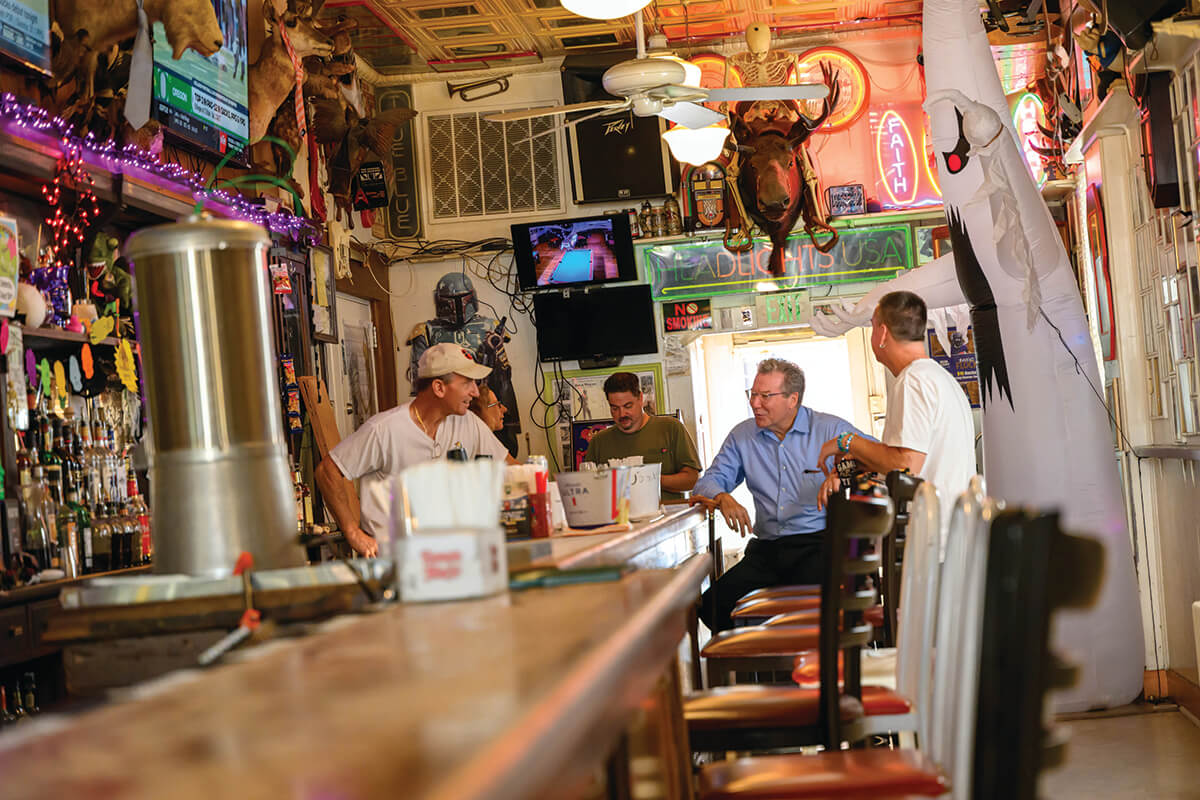History & Politics
Prohibition in Baltimore and The Colorful Story of Undercover Agent Kitty Costello
From the start, the effort to drag Baltimore into compliance seemed doomed.

It is occasionally reported that Maryland was the only state not to ratify Prohibition. Not true. With temperance support in its conservative counties, Maryland was the sixth state to ratify the 18th Amendment. (Cheers to Connecticut and Rhode Island, the only states to fight for their right to party.) What made Maryland unique, however, is that when the alcohol ban did go into effect, lawmakers in Annapolis did not pass legislation to enforce the federal measure. Call it passive resistance.
Governor Albert Ritchie, who first won election as Prohibition went on the books, was an 18th Amendment opponent throughout his four terms. Of course, so was Baltimore scribe, social critic, and homebrewer H.L. Mencken and, interestingly, Cardinal James Gibbons, who called passage of the ban “a national catastrophe, little short of a crime against the spiritual and physical well-being of the American people.”
Not to be outdone, Rabbi Menochim Weisblatt was charged with the possession and sale of liquor following a raid of his East Baltimore Street home. News accounts mention the discovery of 50 gallons of wine. (Protestants crusaded against alcohol. Jews and Catholics, partial to sacramental wine and their immigrant faithful, not so much. In many ways, today’s rural-urban political divide has its roots in Prohibition and the increasingly pluralistic society of the 1920s.)
The feds did what they could to rein in bootleggers and speakeasies before the “noble experiment” came to a screeching repeal 90 years ago this month, although Prohibition seemed doomed from the start here.
Asked by the head of the Prohibition department, visiting in 1922, if Baltimore was making progress, acting city chief Edward Lindholm said plainly, “I can’t say we are…We knock off a big still today and tomorrow there are two in its place.”
One Prohibition sleuth determined it took the average out-of-towner 18 minutes to track down a drink in the city. No doubt hobbling policing efforts was the grand jury investigation of Lindholm’s predecessor for misconduct. The Belvedere hotel’s legendary Owl Bar deployed ornamental owls behind its bar to tip off patrons to federal agents. According to lore, the owls, one of whom still mans its perch, blinked when it was safe to imbibe.
No doubt also hobbling Baltimore policing efforts was the grand jury investigation of Lindholm’s predecessor on misconduct charges. (In New York, 100 agents, some with direct ties to bootleggers or bootleggers themselves, had been terminated for taking bribes after just two years of Prohibition.) That said, there were plenty of arrests for drunkenness and disorderly conduct in Baltimore—33,000 plus in 1920 and 1921 combined, more than 35 percent of all arrests—and high-profile federal busts. Just before Christmas 1924, federal agents operating out of Baltimore seized 36,000 bottles of beer—labeled “catsup”—from a Canton railyard.
In an episode that sparked national headlines and ultimately a U.S. House investigation, local undercover special agent Esther Holden, alias “Kitty Costello,” was sentenced to 30 days in jail for contempt and then flouted in Congress for setting “a record of waste and extravagance.”
Evidence gathered by the chameleon-like Miss Holden, who was the daughter of a Baltimore County deputy sheriff and frequently changed her name and hair color, had led to numerous arrests. The Washington Post would describe her as the “red hair former undercover agent…and terror of Washington and Baltimore bootleggers,” who was said to call on “purveyors of intoxicants in a voice that could not be denied.”
Most famously, she was involved in the sting operation targeting known bootlegger Clarence Morsberger, who owned restaurants in Baltimore and Catonsville—where 101-year-old Morsberger’s Tavern, pictured above, bears the family name to this day. Morsberger was sentenced to six months in jail and fined $300 on the condition he padlock his premises for a year after barrels of beer and bottles of whiskey were found. His bartender earned 14 months for serving Miss Holden and another agent gin.
“The Monroe Street restaurant is gone. But there was also a speakeasy in the basement at the current tavern in Catonsville,” says Susanne Morsberger, the family historian. On a recent visit to the bar, a contractor doing some minor work pointed out a “false” wall in the basement, where beer and booze were said to be stashed during raids. “It’s a miracle, after Prohibition,” she says, “the tavern survives at all.”
Miss Holden was held in contempt because she refused to testify in the Morsberger case. Reportedly, she tore up a summons and threatened to kick a U.S. marshal down the stairs of the Washington apartment where she was found, stating she feared for her life if she returned to Baltimore.
Later, in an investigation led by colorful New York U.S. Rep. Fiorello LaGuardia, it was revealed that Holden and another special agent, only identified as a Mr. Yates, had registered as a married couple at a Washington hotel, racking up $532 in “entertainment” expenditures—the equivalent of nearly $10,000 in 2023—over a month of lavish dinners and drinking parties.
A Wisconsin congressman suggested the saga was just one more instance of federal dollars being tossed “down the sewer of Prohibition.”
“I think it was thrown down the gullets of the agents,” shot back LaGuardia.